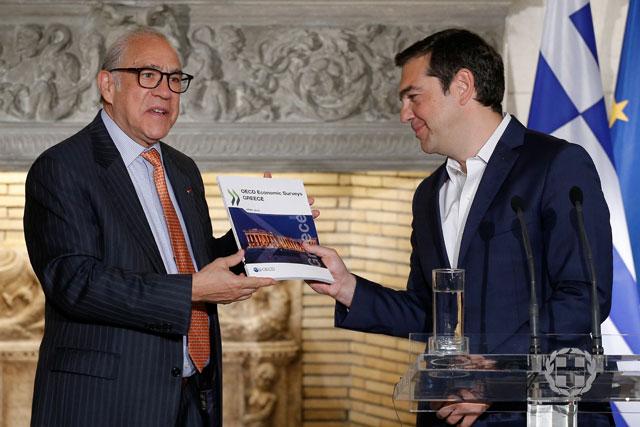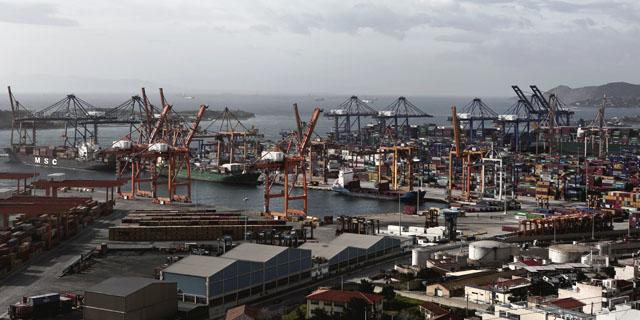You are here
Greek economy back on track — OECD
By AFP - Apr 30,2018 - Last updated at Apr 30,2018

General Secretary of OECD Angel Gurria gives Greek Prime Minister Alexis Tsipras a copy of the OECD report on Greece, at the Maximos Mansion in Athens, Greece, on Monday (Reuters photo)
ATHENS — After years of agony and deep reforms, the Greek economy is finally on the path to recovery, the Organisation for Economic Cooperation and Development (OECD) said on Monday.
Public finances have gained in credibility and investors are feeling confident again about Greece’s prospects, the OECD said as it presented a report on the country that is slowly emerging from years of austerity after narrowly avoiding crashing out of the eurozone.
But Athens still must tackle unemployment, poverty and inequality which all remain high, the OECD said.
“After significant reforms, Greece’s recovery from deep economic depression is finally gaining traction,” the Paris-based body said in a statement.
“Despite these positive developments, unemployment, poverty and inequality remain high, wages are low, investment remains depressed and productivity keeps falling,” it cautioned adding that “the public administration is still facing important efficiency challenges, and while tax collection has improved, avoidance is widespread”.
Greek unemployment, the highest in the eurozone, will progressively slide to 20.4 per cent in 2018 and 19.4 next year, the OECD predicted in the report.
OECD Secretary General Angel Gurria told reporters in Athens that the Greek economy was now on track to grow by 2 per cent this year and by 2.3 per cent in 2019.
Greece’s gross domestic product showed growth of 1.4 per cent last year after nine years of deep recession prompted by a debt crisis.
“This is the story of your success and of the Greek people,” Gurria said at a joint news conference with Prime Minister Alexis Tsipras.
Greece had undertaken the “most ambitious programme of reforms we have seen in recent years”, Gurria said, “a programme that is starting to break through, to happen”.
Greece’s debt now needed to be “relieved, restructured”, Gurria said. “The question of the debt has to be addressed by the institutions,” he said, in reference to ongoing debt talks with the European Union and the International Monetary Fund.
Eurozone finance ministers on Friday set a two-month countdown to agree Greece’s high-wire exit from eight years of bailout programmes with divisions deep over how much debt relief Athens actually needs.
Greece has been at the mercy of three bailout programmes since 2010 when its public finances collapsed, pushing the country into a deep economic depression and bringing crisis to the eurozone.
Athens has yet to rubberstamp its last reforms, including a round of controversial privatisations, with eurozone ministers demanding full delivery ahead of ministerial talks in Luxembourg on June 21.
Related Articles
Greece formally requested a six-month extension to its eurozone loan agreement on Thursday, offering major concessions as it raced to avoid running out of cash within weeks and overcome resistance from sceptical partners led by Germany.
ATHENS — EU Economy Commissioner Pierre Moscovici said Tuesday he is optimistic about concluding an overall deal on Greece’s latest bailout
German politicians kept up the pressure on Greece over the weekend to implement reforms, with Economy Minister Sigmar Gabriel warning Athens in an interview that a third aid package would not be on the cards unless the Greeks made some changes.

















